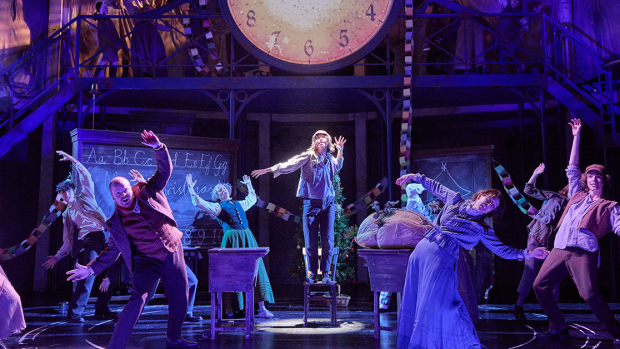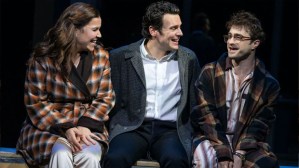”A Christmas Carol” at the Rose Theatre – review

© Mark Douet
In the 19th century, Britain’s “Ragged Schools” provided the country’s poorest children with free lodgings, clothes, food and education. Charles Dickens was inspired to write A Christmas Carol after visiting such a school, and it is now the setting for Morgan Lloyd Malcolm’s adaption at the Rose Theatre. In a feminist nod to Malcolm’s previous work (Emilia) she has a female Scrooge who must work doubly hard in life because she is a woman. The production leans into the ghostly horror side of the story and features two community casts of 21 and 20 young people, all hailing from the Rose’s 1200-strong youth theatre.
We open with three floors towering above, draped with clotheslines and rags, and blackboards below. Scrooge’s nephew, the affable Fred (Jacob Towey) announces that Scrooge (Penny Layden) has been stingy, and the school can’t afford a Christmas party. The children begin to lament, until suddenly magical trickster Charlie Dickens (played with mischievous glee by Elexi Walker) pops out of a wooden chest. She teaches the children about storytelling and magic as the ensemble breaks out into song and dance – Olivia Shouler’s punchy choreography is executed with sharp skill by the youth cast and is reminiscent of Oliver!, while Walker’s power vocals inject sparkle into the mix.
The cast pulls out all the stops. Natasha Magigi shines in her small role as Mrs Cratchit, belting out numbers and serving sharp comic timing. Layden’s Scrooge has layers, gradually peeled away to reveal a vulnerable, scared child, in a gorgeously tender scene at her own grave. Bouncing between earnest, touching, cheeky and comic, Lily Rowell, Luke Groake, Amelie Abbott and Chloe Nichols control the action as the principal children, and, along with Dickens, show Scrooge the three spirits and encourage her to change her ways. Direction is tight, and a dark colour palette of blues, purples and other playful lighting create a spooky sense of enchantment. The audience is gripped from start to finish.
The production itself is a mixed bag. Music and sound are spot-on – if only Eamonn O’Dwyer’s catchy soundtrack was available to listen at home! A three-person puppet of the ghost of Christmas future is animated with care, skill and spooky breathwork by the young cast. Still, set, props and costumes are variable. The ensemble take us around the story’s locations dynamically with shifting scenery, but the addition of aerial work is anticlimactic. Costumes, make-up and props could go further – ghostly make up is not very scary, and there are a couple of clumsy onstage costume changes.
Props are used well – the audience all laugh when Scrooge puts on her famous night-hat and when a giant turkey is hauled onstage by the small Silvia Shea as Ernie Cratchit.
The script is largely convincing, but glosses over emotional shifts. There is wit and a sensitively handled backstory added in about Scrooge’s traumatic childhood. But the Cratchits’ grief for Tiny Tim is fleeting: they are sad for half a minute, then rush out to play in the snow.
Though Layden gives a beautifully executed transformation as Scrooge, it feels like something is missing in the writing to alter her so completely from a deeply traumatised and friendless old woman to a happy-go-lucky member of the community.
Nevertheless, the Rose Theatre’s A Christmas Carol is a magical, ghostly, all-singing, all-dancing spectacle of children’s theatre and, putting its shortcomings aside, if you are not spellbound by the incredible cast of adults and young people, you must be a Scrooge yourself.














